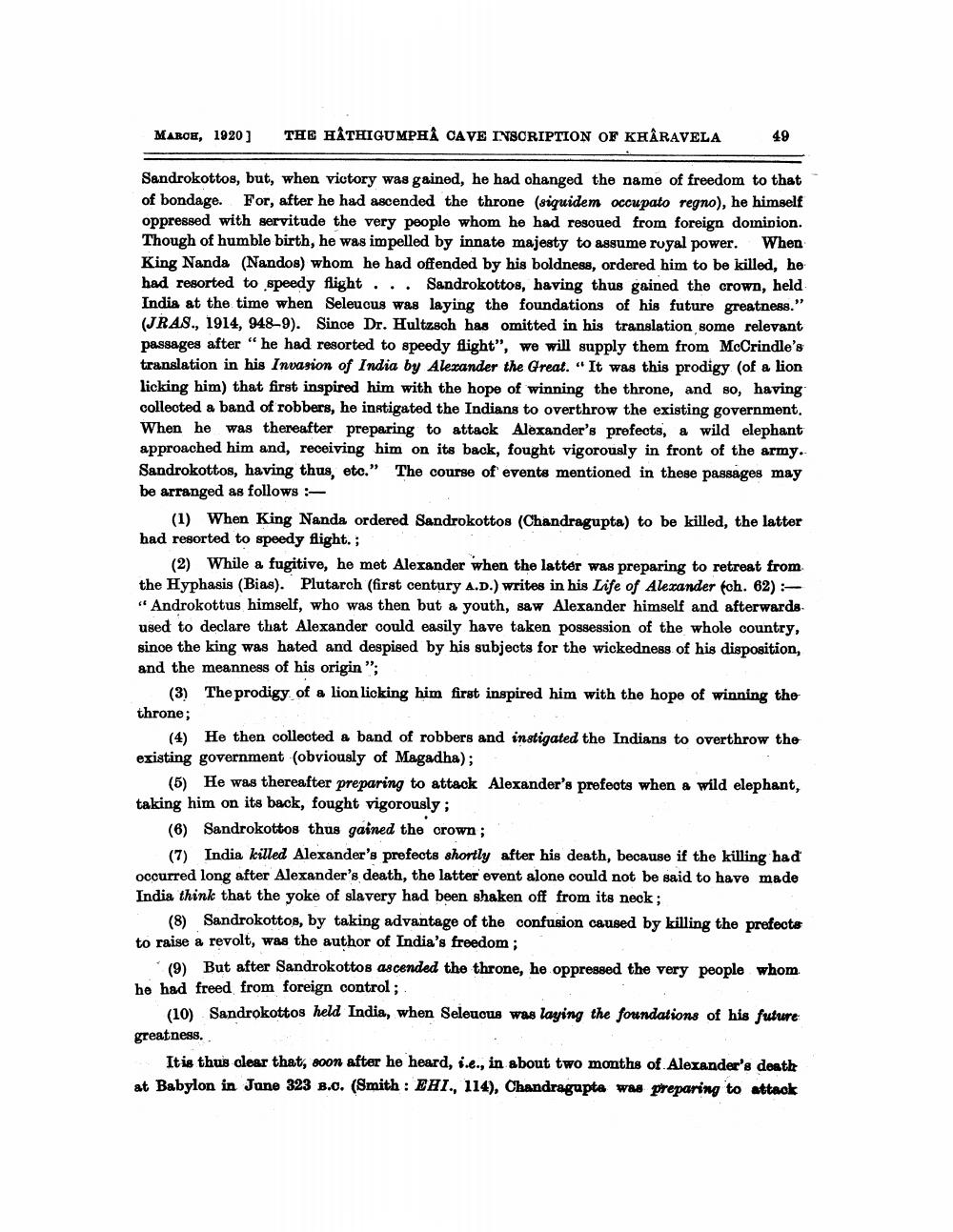________________
MARCH, 1920] THE HATHIGUMPHA CAVE INSCRIPTION OF KHARAVELA
Sandrokottos, but, when victory was gained, he had changed the name of freedom to that of bondage. For, after he had ascended the throne (siquidem occupato regno), he himself oppressed with servitude the very people whom he had rescued from foreign dominion. Though of humble birth, he was impelled by innate majesty to assume royal power. When King Nanda (Nandos) whom he had offended by his boldness, ordered him to be killed, he had resorted to speedy flight... Sandrokottos, having thus gained the crown, held India at the time when Seleucus was laying the foundations of his future greatness." (JRAS., 1914, 948-9). Since Dr. Hultzsch has omitted in his translation some relevant passages after "he had resorted to speedy flight", we will supply them from McCrindle's translation in his Invasion of India by Alexander the Great. "It was this prodigy (of a lion licking him) that first inspired him with the hope of winning the throne, and so, having collected a band of robbers, he instigated the Indians to overthrow the existing government. When he was thereafter preparing to attack Alexander's prefects, a wild elephant approached him and, receiving him on its back, fought vigorously in front of the army. Sandrokottos, having thus, etc." The course of events mentioned in these passages may be arranged as follows:
49
(1) When King Nanda ordered Sandrokottos (Chandragupta) to be killed, the latter had resorted to speedy flight.;
(2) While a fugitive, he met Alexander when the latter was preparing to retreat from the Hyphasis (Bias). Plutarch (first century A.D.) writes in his Life of Alexander (ch. 62):"Androkottus himself, who was then but a youth, saw Alexander himself and afterwards. used to declare that Alexander could easily have taken possession of the whole country, since the king was hated and despised by his subjects for the wickedness of his disposition, and the meanness of his origin";
(3) The prodigy of a lion licking him first inspired him with the hope of winning the throne;
(4) He then collected a band of robbers and instigated the Indians to overthrow the existing government (obviously of Magadha);
(5) He was thereafter preparing to attack Alexander's prefects when a wild elephant, taking him on its back, fought vigorously;
(6) Sandrokottos thus gained the crown;
(7) India killed Alexander's prefects shortly after his death, because if the killing had occurred long after Alexander's death, the latter event alone could not be said to have made India think that the yoke of slavery had been shaken off from its neck;
(8) Sandrokottos, by taking advantage of the confusion caused by killing the prefects to raise a revolt, was the author of India's freedom;
(9) But after Sandrokottos ascended the throne, he oppressed the very people whom. he had freed from foreign control;
(10) Sandrokottos held India, when Seleucus was laying the foundations of his future greatness.
It is thus clear that, soon after he heard, i.e., in about two months of Alexander's death at Babylon in June 323 B.C. (Smith: EHI., 114), Chandragupta was preparing to attack




